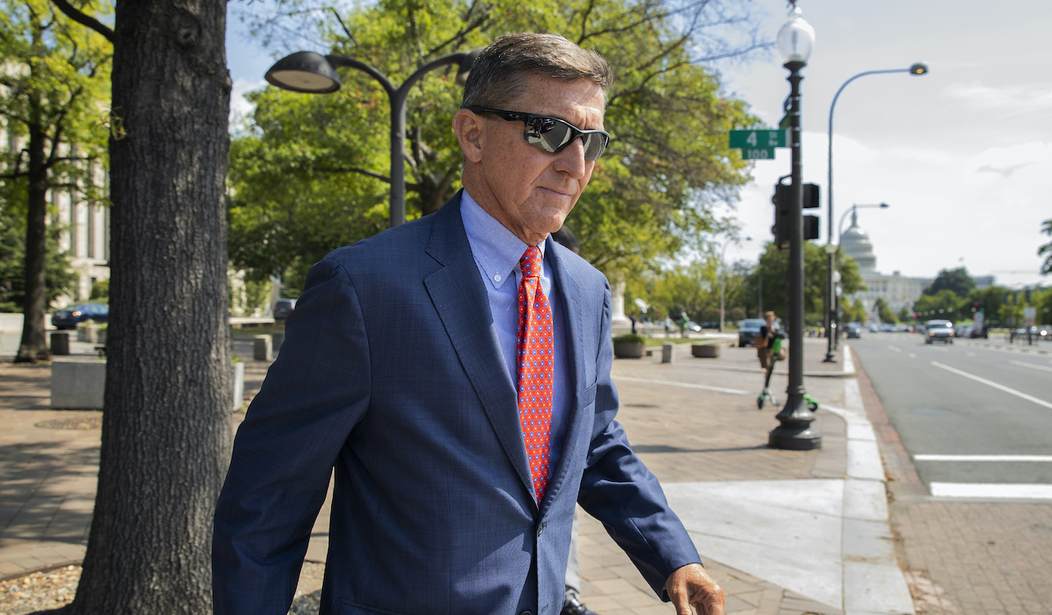
Or What Passes for a “Take Down” of Department of Justice Action When Written by Three People Who Don’t Understand the Subject
Lawfareblog, the noted leftwing publication that serves as the unofficial – or maybe official? — press outlet for all favorable James Comey stories, just couldn’t help itself after the DOJ motion to dismiss the case against General Michael Flynn yesterday.
Benjamin Wittes, Lawfareblog founder and well known “Best Friend Forever” of disgraced former FBI Director Jim Comey, became famous on Twitter for his “baby cannon” videos which he used to give advance warning of impending developments during the Special Counsel’s Office investigation.
BOOM!!!https://t.co/QK0IPoWPdL pic.twitter.com/FqJXxAJcan
— Benjamin Wittes (@benjaminwittes) February 16, 2018
The Lawfareblog fans just knew at some point one of those cannon shots would land in the Oval Office. Alas, they were disappointed to the end.
Ben’s baby cannon has been largely silent lately. But yesterday’s DOJ motion to dismiss the case against Gen. Flynn pretty much did to Ben’s little cannon the same thing “Band of Brothers’” Easy Company did to the 105 mm howitzers at Brecourt Manor on D-Day.
Undeterred by their ignorance on the subject, or the facts underlying the matter, Ben and his fellow travelers published their version of a “takedown” of the DOJ motion.
Neither Wittes nor Quinta Jurecic, another of the three co-authors on the piece, are attorneys. Needless to say, neither has ever worked for the Department of Justice. Susan Hennessy, the third author credited on the story, was an attorney in government experience, but it was as a member of the Office of General Counsel for the National Security Agency.
They have opted to keep to themselves their bona fides to deconstruct a DOJ filing that lays out misconduct by law enforcement components of DOJ. But they can’t hide the ignorance that was exposed by what they wrote.
Before we get to their expressions of ignorance, let’s take up a more pressing concern – their lies.
I want to jump to the middle of their article, where they gaslight their readers for the purpose of implying sinister motives to the DOJ filing. They wrote:
The government’s argument hinges on the notion that Flynn’s December 2016 phone call with Kislyak—in which Flynn advised the Russian government not to respond to sanctions newly issued by the Obama administration in response to Russian election interference—was, fundamentally, not a matter of concern.
The highlighted portion is a lie. Flynn never did any such thing. Flynn expressly denied to the FBI agents during the interview that he did such a thing. In their report of the Flynn interview, the agents wrote:
“The interviewing agents asked FLYNN if he recalled any conversation with Kislyak in which the expulsions were discussed, where Flynn might have encouraged Kislyak not to escalate the situation, to keep the Russian response reciprocal, or not to engage in a “tit-for-tat.” FLYNN responded “Not really. I don’t remember. It wasn’t “Don’t do anything.”
So, the Agents asked Flynn if he “encouraged” the Russian Ambassador “not to escalate the situation”. Part of Flynn’s response was that he had not said to the Russian Ambassador “Don’t do anything.”
Is it too much to ask so called “journalists” at Lawfareblog to report basic facts accurately? Was this not a crucial distinction? What purpose was behind the obvious mischaracterization of facts employed by Wittes/Jurecic/Hennessey in their story? Was it a knowing “lie” used by them to paint Gen. Flynn in the worst possible light as part of their screed against the DOJ filing?
Or maybe Flynn’s “denial” was one of his “lies”, and what he really said was what they attribute to him – that he “advised the Russian government to not respond…”
Sorry Ben/Quinta/Susan – the Special Counsel kicked the legs out from under your stool on that more than 2 years ago. In the “Factual Basis” for Gen. Flynn’s guilty plea, SCO prosecutor Van Grack wrote the following:
“Immediately after his phone call with the [Presidential Transition Team] official, FLYNN called the Russian ambassador and requested that Russia not escalate the situation and only respond to U.S. sanctions in a reciprocal manner.”
That’s a factual representation made by the SCO to the Court in an official document meant to be accepted as true.
I could stop there. In a courtroom the most effective cross-examination of a hostile witness goes immediately to a readily provable lie told by that witness, force the witness to admit to the lie, then look knowingly at the jury with a slight shrug of the shoulders to convey the unspoken message of “The other side thinks you should trust this witness to tell you the truth.”
But let’s endeavor on and explore a few other expressions of mere ignorance on the subject matter by the Lawfareblog trio.
First, they call the Covington & Burling attorneys who initially represented Gen. Flynn “first class lawyers.” As a former federal prosecutor for 22 years and now a defense attorney for the past 7 years, I do not fear being contradicted when I say that a defense attorney who allows his client to plead guilty to a §1001 violation without seeing the FBI 302 of the interview where the client is said to have lied, and without seeing the evidence in the possession of the prosecutor which supposedly establishes that his client lied in the interview – that attorney is not a “first class lawyer.” I don’t care what firm he works for, or what his hourly rate is. At worst, he potentially provided ineffective assistance to his client — and at the very least he provided very bad lawyering.
At a change of plea hearing, one question posed by a Judge is directed to the defense attorney. The Judge asks “Are you confident that your client is guilty of the crime to which he is pleading guilty today?” How could the “first class lawyers” representing Gen. Flynn answer that question without having seen the “evidence” from the government proving that to be the case? I’ll tell you how – they based their answer on what the prosecutor told them. That is not “first class lawyering.”
Second, the authors describe the agreement between Gen. Flynn and the Special Counsel’s Office (“SCO”) as a “very generous deal” by which he avoided being prosecuted on more serious charges under the Foreign Agents Registration Act. That may or may not have been true. Whether it was a “generous” deal is irrelevant if Gen. Flynn had not actually committed a crime — no deal is “generous” enough in that circumstance. But if it was true, then the SCO violated written DOJ policy in making that “generous deal.”
Under DOJ regulations, the SCO was bound by all DOJ policies. One such DOJ policy – and this has been policy going back at least to the mid-1990s when I started – is that prosecutors should charge and pursue the most serious, readily provable offense. The most serious offenses are those that carry the most substantial sentences. That policy is in writing.
So when the SCO offered Gen. Flynn a “generous deal” that contemplated no jail time, and agreed to forego prosecuting him for more serious violations under FARA when they claimed the evidence of his guilt on those more serious crimes was compelling, they violated written DOJ policy in doing so because the §1001 count was not the “most serious, readily provable offense” they could have brought.
What this actually reveals is that the SCO recognized the weak hand it held in threatening to indict Gen. Flynn, but it was so anxious to gain his cooperation against Pres. Trump in late 2017 — after the Carter Page FISA warrant turned up nothing — that they were willing to do anything to make a deal he would take, so long as they gained his cooperation by doing so. Violating written DOJ policy?? Not a problem. Threatening to prosecute family members?? All in pursuit of the greater good because Orange Man Bad.
The Lawfareblog “experts” rail over the fact that not only did DOJ agree Gen. Flynn should be allowed to withdraw his plea, DOJ also took the position “that the entire case should be dismissed with prejudice”, which they correctly understand to mean that it cannot be refiled.
Ummm — the “entire case” consists of a single count charging a violation of §1001 filed in a criminal information. That is the “entire case” that is being dismissed and cannot be refiled. If there are truly other crimes that Gen. Flynn has committed, any other such crimes could still be the subject of a future prosecution.
Next, the Lawfareblog trio turn their focus on the 20-page brief filed by DOJ – labeling it as “not an honest document.” Yet, after claiming it that it presents a “history of the Flynn case” and the government’s own conduct which is “flawed”, they can’t be troubled with offering a factual narrative that contradicts the government filing. I guess we’ll just have to take their word for it.
They note that only acting US Attorney Timothy Shea signed the motion, with no signature of any career prosecutor – including former SCO prosecutor Brandon Van Grack who handled the Flynn prosecution. They surmise that Van Grack’s withdrawal from the case ahead of the filing was some form of protest on his part with respect to the motion.
What they don’t note is that Van Grack withdrew from several other cases at the same time – unrelated to the SCO or Flynn prosecution. That suggests Van Grack is either leaving DOJ, or he is under investigation by the Office of Professional Responsibility – possibly for having misled Judge Sullivan on the status of his Brady production in the Flynn case – and is no longer authorized to appear in Court on behalf of DOJ. That happens — it happened exactly like that to a friend of mine who was cited by a judge for exactly that same problem.
But they do make a layman’s error in criticizing DOJ’s legal position that the interview of Gen. Flynn was justified. They write that DOJ was wrong to claim
“there is no reasonable basis to even interview a senior government official when that person has engaged over sanctions imposed against a foreign adversary government that interfered in an election – and who subsequently lied to the Vice President of the United States about the substance of his conversation with an agent of that government. Based on this position, the Justice Department today took an even greater leap: that it is perfectly legal for the official, if interviewed under these circumstances, to lie through his teeth repeatedly to the FBI agents who show up to interview him.”
This passage exposes their ignorance of the policies and procedures of the Department of Justice and FBI that govern the manner and circumstances under which US citizens can be interviewed by agents of the FBI. The first rule is that no interviews are allowed except with regard to properly predicated and open investigations. Agents aren’t allowed to just show up on your doorstep and ask you questions. They can only get there by following well-established rules and procedures by which they establish a legitimate reason to knock on your door
The problem with their analysis – and the latter portion of the article which purports to go through all the suspicious facts about General Flynn that were part of the original basis for opening a counterintelligence investigation of him in August 2016 – is that they ignore the FACT that the FBI had conducted a nearly 5-month long investigation of all those scary facts and concluded …… that Gen. Flynn was NOT a Russian agent.
They can’t understand why DOJ did not want “more” investigation in the form of an interview, yet at the same time, they ignore the fact that the FBI had just done 5 months worth of investigation and came up with …. nada — “no derogatory information” to support the basis for which the counterintelligence investigation was opened in the first instance. The calls with the Russian Ambassador did not change that fact. Because they did not change that fact, the calls were not a basis upon which the counterintelligence investigation could be prolonged in order to conduct further investigative activity.
If there was a legitimate inquiry to be made about whether Gen. Flynn’s calls violated the Logan Act, then the FBI should have opened a properly predicated criminal investigation naming Gen. Flynn as a subject of the investigation, and violation of the Logan Act as the suspected crime. They did not do so. Whether they “could” have done so is irrelevant. The fact is they didn’t. And that is how the procedure is designed to work and that is how it does work. The FBI does not go out interviewing citizens based on a “hunch”.
But, a message came down from “the Seventh Floor” – the offices of Comey and McCabe – to keep open the counterintelligence investigation of Gen. Flynn, so Strzok gave that instruction. But that was improper under FBI procedures — the investigation had already been determined to be unfounded and directed to be closed. Delays in completing the paperwork to close the investigation didn’t change that outcome.
What DOJ said Thursday is that there was nothing in the transcripts of the Flynn calls that justified holding that investigation open so the direction to do that was meaningless. “Open” counterintelligence investigations are not “catch-alls”, where agents just run around doing whatever occurs to them, justifying their actions because there was an “open” investigation. There must be a connection between the purpose for which the investigation was opened, and the investigative activity that was undertaken.
These procedural problems in what was done leading up to the interview of Gen. Flynn had to then be considered against the backdrop of the notes and reports of those involved that exposed the pretextual nature of the reasons that were put forward to justify the interview. All that information together — which had not be provided to the defense — made continuation of the case untenable.
Next, the Lawfareblog crowd faults the DOJ filing for presenting a “tendentious version of events” that portrays Comey as insubordinate to a “hapless” Deputy AG Sally Yates. It says the filing relies “heavily on documents released by US Attorney … Jensen, handpicked by Barr to “review” (scare quotes) the Flynn Prosecution.”
Yep – one of the documents used to portray Sally Yates as “hapless” by Barr’s “handpicked” “reviewer” was a 13-page memorandum of interview – of Sally Yates.
The interview was not conducted by Jensen or that other Barr-appointed thug Durham – it was conducted by members of Mueller’s SCO team.
Yet using Sally Yates’ own words as captured by the Special Counsel, somehow evidences selective use of facts by DOJ. In her own words Sally Yates pretty much states that James Comey refused all efforts at professional persuasion to alter his course, and in the final instance simply disregarded everything he had been told by Main Justice – including by Yates in her capacity as Acting Attorney General – and did what he wanted to do. In her own words, her staff “hit the roof” when they were informed that Comey had sent two agents to interview Gen. Flynn. Her staff had uniformly believed that the Trump White House should have been told about Gen. Flynn’s calls before any investigative action was taken by the FBI.
Bottom line – Lawfareblog’s BFFs of James Comey just can’t wrap their heads around the idea that DOJ Officials from the Obama Administration disagreed with what James Comey and Andy McCabe did.
Finally — on claiming that the DOJ filing condones Gen. Flynn having “lied through his teeth” to the Agents — I would only point out that it is a matter of settled law that not all lies to the FBI are crimes. That was the point of the DOJ filing.
And I conclude by noting that the authors of the Lawfareblog article should be thankful that lying to their readers is also not a crime.
Author’s Note: After I completed this story I came across a posting at Patterico.com heaping praise on this Lawfareblog story and the work of Wittes/Jurecic/Hennessey. I invite you all to take a look at that post put up by the proprietor there, and understand that he knows very little about federal criminal law or the operations of the FBI. I once had a close association with that site and the proprietor, but the propreitor is a hard core NeverTrumper, and he tolerates little or no dissent from his views. Pointing out when he was wrong led to a less than amicable parting of the ways between us. So I’m happy to find another way to point out when he is wrong.














Join the conversation as a VIP Member